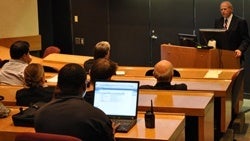September 17, 2010 — Improving the global health care system of the future requires taking action now and focusing on the diverse set of issues that will shape the system of the future, Enrique Ruelas, an international expert on health care quality and managing health care systems, told a packed Harvard School of Public Health audience. Ruelas, Secretary of the General Health Council of Mexico, said that to shape an improved health care system in the future, public health and health professionals must plan ahead. “Like a patient with vertigo, we need to focus on one point,” he said. “We also need images about what might happen—we need a ‘future scope’ that is structured and allows you to establish a direction.”
Ruelas shared his perspective on improving the quality of health care in the future in a September 7 talk at HSPH entitled “Toward the Future of Healthcare Systems: Do We Need a Compass?” The talk was the first Dean’s Distinguished Lecture Series of the 2010-2011 academic year. HSPH Dean Julio Frenk introduced Ruelas.
Ruelas said many babies born today will probably live to age 90. “We’re struggling trying to offer [these babies] a less fragmented health system that is more humane, cost effective, accessible and affordable,” he said. “We have been struggling with these same kinds of problems for years and we don’t know how to handle all the challenges.” However, he said, by conducting “a vigorous exploration of the future” and actively collaborating with other disciplines, ranging from engineering to bioinformatics, new ways can be found to deal with forces that will impact health care systems in the future–issues such as globalization, climate change, the Internet, an aging population, urbanization, violence, chronic disease and global health staffing shortages.
“Perhaps the most important part about thinking of the future is not to wonder if the future will happen, but to define what you want to have happen and try to move things in that direction rather than not knowing where you are going and arrive nowhere,” Ruelas said.
–Marjorie Dwyer
photo: Ned Brown
